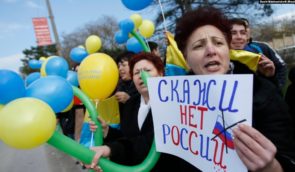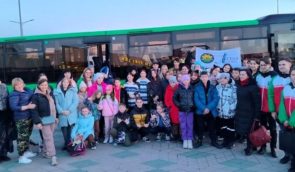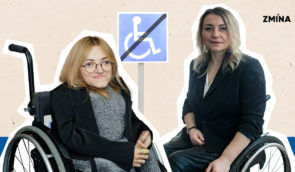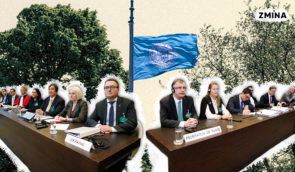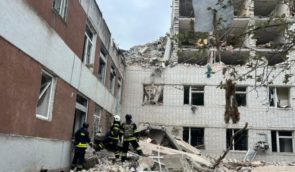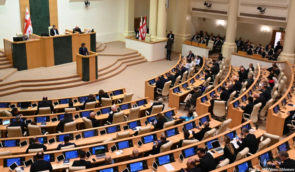Svitlana. ‘I’ve refused Russian citizenship twice’
A girl with a sunny smile in the photo is Svitlana, she came from Crimea. Svitlana has refused Russian passport twice in her life – after collapse of the Soviet Union and after occupation of Crimea … The top-priority values for the girl are freedom, the ability to speak, create, in the end, to live freely.

We continue to publish the stories of people, who lost their homes as a result of the conflict in eastern Ukraine and Crimea, as well as of those, who lent a helping hand in difficult times.
In winter of 1991-1992, I met not just people with guns walking around Grozny, I met my classmates. We were fifteen or sixteen years old, we were actually children, and they were armed. #When the people wearing unmarked uniform appeared in Crimea, that was the first alarm bells and a very powerful sense of deja vu.
February 23, a former classmate of my brother now working at the village council called him and asked, “Do you want to serve your country? You will be given camouflage in the village council, you will become the member of self-defense and protect Crimea from fascists.” My brother wondered ironically, “Where are the fascists? How much will you pay?” She answered, “There will be fascists. Well, that’s for the idea!” #Everything looked scary and terribly cynical there in Perevalne [Crimean village, where Ukrainian military base was seized by the “green men”]. The sons of the officers, the former officers were defending the military base with scotch-taped guns. They were surrounded by the well-armed army, who had good camouflage, guns, and no marks. About twenty local young guys from the so-called “self-defense” were among them. If the Ukrainian officers had lost their nerve and someone had moved the trigger, there would have been the armed conflict – Ukrainian officers shoot at their children.

I am resistant to suggestion, but I gave under and came to Kyiv on March 1. I had not watched TV or read newspapers in Crimea, but my inner circle had broadcasted such dense flow of information it was difficult not to believe in it. I came to Kyiv, still not understanding what is happening in Simferopol, left Lesha [Svetlana’s husband], left my children and my father, while the “green men” were all around. When I arrived in Kyiv and went to the Independence Square, I saw the farewell to the heroes of the Heavenly Hundred. #It became so clear for me where the truth was at once. The real truth was there – in that endless silent stream of people who came with candles, flowers. There was a lot of dignity and sorrow.
When we left Maidan, my friend said with a drawn face, “Svitlana, just don’t worry. Russian parliament approved troop deployment in Ukraine.” I realized that most of my life was over, I lost sleep and appetite. It was difficult to eat and sleep for two months. I did not made any decision then – the decision was made for me. #I did not want to move anywhere, I wanted to live my life, as I had been living two past years. It was the heyday of my career, my projects. I do not imagine now how it is possible to bring people from Ukraine to Russia and vice versa. I left much there – a plot of land, where I was going to build a house, my Crimean land, my pride. I had to abandon my dreams. I left my father and brother there.
.jpg)
I have my own story about Russian citizenship. I was born in Grozny, in the territory of the Russian Federation. After the USSR had collapsed, I automatically became a citizen of Russia. I had to go through the full procedure of renouncing Russian citizenship to get Ukrainian passport. #I supposed to become a citizen of Russia as all Crimean residents, and I refused that for the second time. I am made the second offer, and I have to refuse again.
.jpg)
I love saying what the heart thinks the tongue speaks. Sometimes I say stupid things but I don’t want to be killed, jailed or punished for my nonsense. #It is very important for me to call a spade a spade, but it can’t be done now in Crimea. We arrived here in June. We spoke in whispers about Crimea until mid-July, we caught ourselves at that and laugh. I will never wish this for my children. These are my requirements for the space, which I will bring up my children in. It is very important for me that my children have the opportunity to hear the truth and speak the truth.
There are many volunteers who came from Donetsk and Luhansk. Volunteering is the way not to go mad. You start to help those, who feel worse than you. These people are integrated into new life faster and are healed faster. There is a saying: don’t give a man fish, give a fishing rod. But I am glad that people continue to help. It is important for me because #according to the official statistics, “there were no refugees or internally displaced persons” during the Chechen war in Russia, as if there had been no war and civilians had not suffered. In this regard, the Ukrainian society and the state help as much as they can. Our nation has never been in such a situation, we have very weak social institutions.
I am proud that we have survived, we have moved. We have remained as we are, I do not have to keep silence now. I can speak, #I can criticize new reform, my government, to go on the square alone or with friends and say anything I think. It is a sign of a free country for me. I have chosen this freedom and I’m very proud of myself. I am proud of my husband, I was really scared to leave Crimea, but my husband gave the impetus, his masculine strength and determination to that and said, “Trust me.” It was very important for me.
.jpg)
The story of Svitlana is presented within the framework of the exhibition “My Place”, organized by the Educational Centre “Space of Tolerance” and the Congress of National Communities, supported by the Royal Netherlands Embassy. The authors of the texts are Kyra Kreyderman and Uljana Ustinova. The photos were taken from the family archive.

